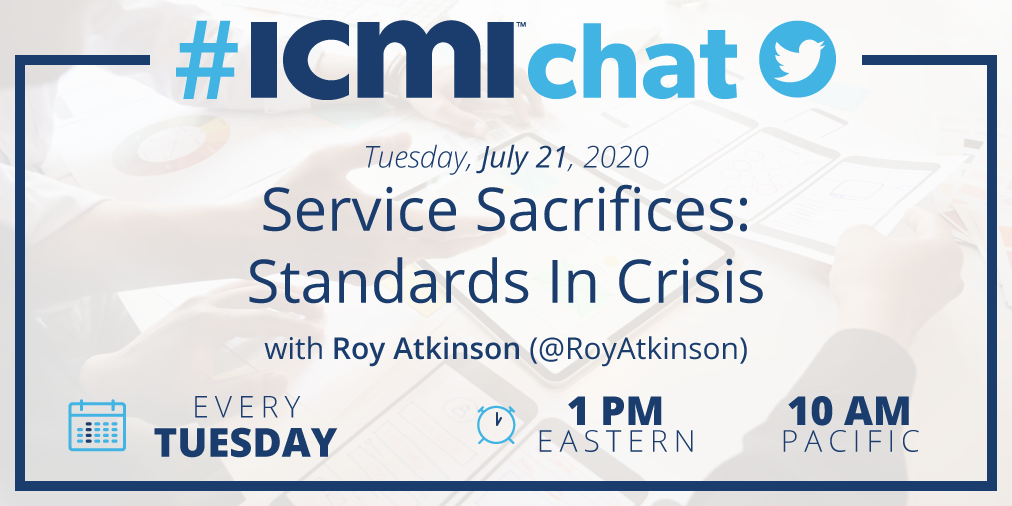By
The Editors
|
Date Published: July 15, 2020 - Last Updated September 08, 2020
|
Comments

If you're a fan of business reality TV shows like Bar Rescue, The Profit, or Shark Tank, you've heard the now-old cliche, "know your numbers!" This advice resonates even more loudly in the contact center and customer experience community. Contact centers thrive on their metrics, and customer experience professionals love their measurements. They guide our actions, offer encouragement to persist, and unlock valuable insights from our data.
Tell us how your business has responded to the COVID-19 pandemic, and you'll receive a free copy of our research when it's complete.
We asked the practitioners of #ICMIchat what they measure these days, and how the landscape is changing with the times. Even if you're reevaluating your goals this year, it's more important than ever to support them with practical measurements. We heard it multiple times, "what gets measured gets done."
Join us on Tuesdays at 1 p.m. Eastern, 10 a.m. Pacific to weigh in on the contact center industry's most pressing challenges. Next week, we explore "Service Sacrifices: Standards In Crisis." A question preview follows this article.
Metrics Matter
There's an old saying that goes, "you cannot manage what you don't measure." Measurements allow us to track progress towards our goals, determine how well we're doing, and make adjustments when our performance drifts off course. There are no shortages of things to measure along the customer journey, and your business' measures may be unique to your mission and strategy. One thing is certain, to be successful, you'll need to figure out what these metrics are and keep close watch over them.
For one, what gets measured gets done. For another, you cannot successfully run a contact center without the right info. Hope isn't a strategy and if you're ill informed you're hoping you come in on budget and hope your ppl are happy and hope your CX is satisfactory.
You can’t act to improve what you don’t measure. Metrics help us quantify the extent of our improvement or degradation. They’re not self-sufficient, yet very important.
Metrics and measurements are a core competency of CX as a business discipline. Please don't create a program and call it customer experience if you're not planning a metrics and governance component. The longevity of your CX "initiative" is at stake.
Selection Is Key
Contact centers generate a wealth of data. It's tempting to put everything on a dashboard. "I know what all these gauges mean, and they'll all vital," we say! In practice, however, this approach can become overwhelming and distract us from what really counts. That's why choosing a couple of Key Performance Indicators (KPIs) closely aligned with our strategic goals is crucial. All KPIs are metrics, but not all metrics are meant to be KPIs.
Anything measured can be a metric, but KPI is a title reserved for the most important metrics. The ones that go on the top of the dashboards.
It's a common mistake to use metric and #KPI interchangeably. However, the problem is, they aren’t the same—and using them correctly makes a difference. Here's a great blog post that outlines the differences between metrics & KPI.
Results Driven
The mere awareness that a measure is monitored can drive both positive and negative behaviors. While this might mean increased performance and positive outcomes, it often leads to unintended consequences that harm stakeholders. Leaders must understand what actions a metric will encourage, discuss the extent and intent of goals with the team, and verify that behaviors have the desired effects on the business.
Knowing something is being measured and putting the info in front of ppl will cause them to react. Whether there is set goal or not, there will be some sort of reaction. What's that quote "What my boss is interested in I'm fascinated by" or something?
A key component of any discussion of metrics is asking “how are we going to talk to our team members about them?” Role play discussing metrics with your team members. “Why is this important? Describe to me how it’s calculated, where the data comes from.”
Metrics are like carrots and sticks. You can use them either ways. If you are not careful, the employee will get the carrot and the customer the stick.
Collateral Damage
Are your customers standing in the way of agents' achievements? If you're measuring and rewarding agents to avoid long conversations and prevent escalations, your customers' needs might be the first victim. Sadly, it still happens way too often. Be careful when choosing metrics that might endanger the customer experience, and involve customer-facing employees in the goal-setting process.
Metrics can negatively impact stakeholders. To eliminate or reduce any negative impacts, before selecting a metric, it's best to identify the key stakeholders (internal/external) supported by the contact center. Based on the list, select metrics that make sense.
Metrics measure stuff but don't always offer a true glimpse of what the customer is going through or how happy or not they are or if their issue is truly resolved. Measurement just to measure is useless.
Metrics should never be used as a policing mechanism in CX. Instead, they should be used as a triage tool. But it takes a skilled messenger to ensure people understand that. Otherwise, they can feel like metrics are just extra oversight.
Less May Be More
While contact center agents should contribute to discussions about customer experience metrics and goals, managers must also be careful to avoid oversharing. Agents already have a lot on their minds, and some measures may not be relevant or could make their job seem daunting. Transparency is generally good, but it also has a dark side.
Shouldn't only in that I wouldn't want to overwhelm them with data they don't need to care about. It can drown out the data you want them to focus on.
I recommend being transparent with the front-line generally, but I’ve noticed that financial measurements like costs are better off not shared to them. These metrics can dampen spirits even when they never intend to.
Transparency is important in a #ContactCenter so I would share agent-based measurements w/ those stakeholders. Unless there is a policy exception, there is no reason to muddy the waters & share ALL key stakeholders measurements with front-line agents.
I think so. Important to (1) share Agent performance related metrics they’re held accountable for and (2) a curated set of company KPIs, with a clear line that shows the relationship between the two and highlights how Agents contribute to KPIs.
The Year Of Seeing Clearly, Or Not
With so much happening in 2020, metrics have been all over the map! In times of monumental change, uncertainty, and fundamental shifts in our businesses, it may be necessary to rethink what's important. As many things happen outside of our control, our community seemed to appreciate focusing on matters within their spheres of influence, such as agent satisfaction and customer effort.
Customer effort score is definitely on the top of the list. Customer sentiment and employee sentiment scores are the others.
I don’t think I’m partial to one, though right now, our employees, customers, business are struggling, so any metric that points the way to how they are feeling is really important.
We’ve just cleaned up so much. Greater insight into overall performance, including output and customer satisfaction for sure. Recently we’ve made escalation info reportable which has uncovered some very insightful and useful nuggets.
I think the biggest leap has come not from any particular metric but from the instant availability of actionable information! That has changed the game for many companies I’ve worked with!
Thoughtful Application
In addition to considering which metrics and measurements count, how metrics are used may also be a little unusual these days. Historical data might have laid a clear and predictable path in the past, but the same can't be said in the present. Additionally, the use of metrics as a coaching and performance management tool also requires a delicate approach. Teams who are exhausted from barely making it by might not have the willpower for ambitious near-term goals.
Well, we can’t forecast with much certainty beyond a few weeks right now. Previous cornerstones of our models don’t currently have the same level of correlation/causation. It’s annoying.
I’ve been keeping an eye on the usual details, although not acting as quickly. I think this is the time to cut some slack, and factor the overall social climate into every decision.
Trending Tomorrow
While some types of metrics may fade, focus on customer experience will be key for years to come. Renewed focus on customer effort, agent experience, and emotional intelligence may be worth enduring a few challenges today. Tomorrow's interactions will be easier and more thoughtful than ever, and progress toward will be measured along the way. Technology is also creating new methods to learn from how we work, and the key performance indicators of the future could be based on things we cannot imagine measuring today.
Ease is still a biggy. Customers expect clean, contactless, inclusive, privacy-centric experiences now. P.S. Have y'all seen all the contactless tech coming to the market right now?
With the world being crazy as it is, probably just keeping the lights on is an accomplishment. The emphasis on CX and empathy is super important right now... so I'd say CSAT/NPS or something in that neighborhood.
I don’t see a huge appetite to make big changes until things stabilize. BUT I have a few clients who say “So much is changing now anyway, maybe we should implement changes we’ve already been thinking about now.” Not just metrics, org changes, new technology etc.
#ICMIchat July 21, 2020
Service Sacrifices: Standards In Crisis

Q1: Do customers relax their expectations for products, services, and commitments in times of crisis?
Q2: Have you observed any businesses taking advantage of crises to provide lesser service for the same price?
Q3: How should businesses communicate which service sacrifices are necessary due to changing market conditions?
Q4: Is it important to distinguish the cause (safety, cost, capability, capacity) of changes to product or service offerings?
Q5: How would you approach a customer whose needs you're unable to meet due to a crisis?
Q6: Do businesses need to reconsider pricing if they're standards have changed? How might experience design be used to offset other setbacks?
Q7: Are there unique opportunities to improve the customer experience and deliver better experiences than ever before?
Q8: Should organizations communicate when operations are restored to normal to reset customer expectations?
Photo by Mike from Pexels.